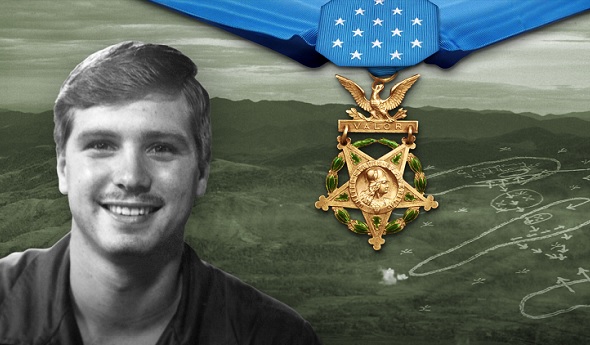
Longtime Official to Receive Medal of Honor
July 31, 2017
By Geoff Kimmerly
Second Half editor
South Haven's James C. McCloughan, a longtime MHSAA wrestling official and coach of multiple sports, will receive the Medal of Honor this afternoon for service in 1969 in Vietnam.
McCloughan, also a retired teacher from South Haven High School, previously received multiple Bronze Stars and Purple Hearts among a number of awards and decorations. During battle May 13-15, 1969, McCloughan risked his life to rescue and treat wounded personnel despite being wounded himself by shrapnel and small-arms fire. A combat medic with the U.S. Army, the 23-year-old McCloughan refused medical evacuation to remain with his comrades.
His rank at the time was private first class. He was discharged from the Army with the rank of specialist.
After his service, McCloughan became a dedicated educator. His bio as a 2008 inductee to the Michigan High School Football Coaches Association credits him with 36 years coaching football and coaching 131 teams total from the South Haven athletic program. He also is a member of the Michigan High School Coaches Association Hall of Fame and Michigan High School Baseball Coaches Association Hall of Fame. He has served as well 25 years as an MHSAA official and is registered to continue this upcoming wrestling season.
The U.S. Army website produced a tremendous multi-media feature on McCloughan in advance of today's ceremony. To see that feature in full, click here, and watch below the Army's video that details McCloughan's service in receiving this high honor. (The photo above also is taken from the linked feature.)

Why They Don’t Officiate Anymore
December 16, 2016
Several years ago, the Michigan High School Athletic Association produced a series of radio and television spots in which MHSAA registered officials explain why they officiate. For the third time in the past 12 years (2004, 2012, 2016), the MHSAA conducted an extensive survey of former MHSAA officials to identify the reasons individuals have left the avocation of high school officiating.
From the 1,065 responses to the 2016 survey, it is demonstrated that career and job changes continue to be the top reason why individuals leave officiating. This has been the No. 1 reason in all three surveys.
Local association politics was again the No. 2 reason, which was the same second place reason in 2012. However, in the 2004 survey results, local association politics was sixth. This illuminates the reality that over the past 12 years there has been a significant shift from local schools hiring officials to using assigners in many, if not all, sports. The concerns are not so much with the association itself (training, recruiting, retaining) but with the assigning dynamic within the association or local area. Many recent MHSAA policy changes and most MHSAA in-service training have focused directly on assigners, and this survey confirms that this must continue and expand.
The next three most common reasons for leaving MHSAA officiating continue to be lack of sportsmanship by coaches, lack of sportsmanship by spectators, and low game compensation. The sportsmanship concerns from these adults must be continually addressed by all MHSAA constituent groups to improve the working conditions for officials.
The MHSAA increased tournament officiating fees at the start of the 2016-17 school year, and many local leagues and conferences have done the same. The reality is that many leagues and conferences are still playing “catch up” from the long fee freezes in the late 2000s and early 2010s when Michigan schools were in historically bad financial shape.
A significant reason to leave officiating seen in all three surveys is the official’s family situation. Many have indicated they left officiating due to time away from their spouse or children, or because of travel time or a family move. These reasons have been in the top 10 in all three surveys, and could have ranked higher had these individual questions been combined into one single category.
One troubling trend from the 2016 survey is that lack of sportsmanship by players was inside the top 10 (No. 7) for the first time since 2004. In 2012, this issue with students was No. 11. This may show that players are much more apt to argue, criticize or demonstratively disagree with calls than years ago.
(This posting was prepared with the assistance of MHSAA Assistant Director Mark Uyl.)

